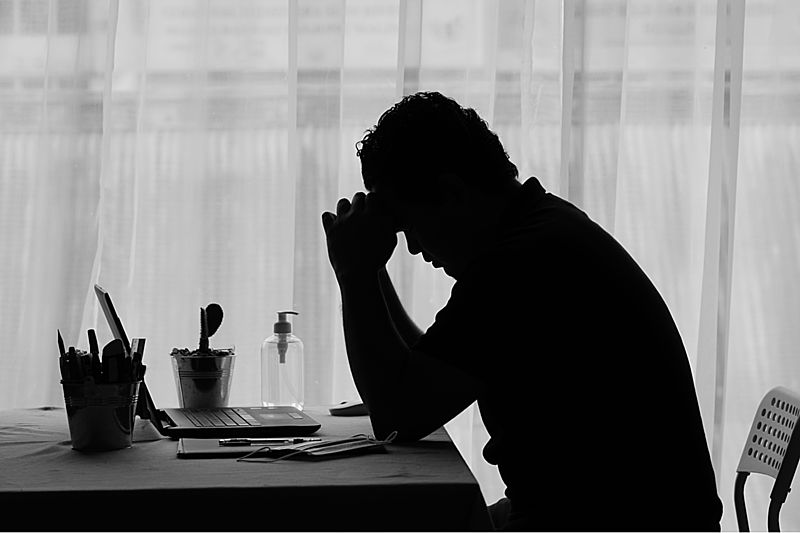Dealing with the Downs and Outs of Depression
by Gregg Krech
Usually, depression is not a mystery.
It is a state of mind and body which often reflects the circumstances of our life, and our view about those circumstances.
The death of a loved one. The breakup of a long term relationship. The unexpected loss of our savings in an investment gone wrong. Rejection. Illness. Disappointment. All of this can stimulate a chain of emotions and thoughts characterized by sadness and despair. Our body also mirrors our suffering, often having difficulty sleeping, losing appetite, sex drive, and feeling fatigued. Just getting up from the sofa is experienced as an ordeal.
But depression does not necessarily require a crisis or triggering event. Years of poor diet, unhealthy living and lack of exercise take their toll. Some of us swim in the stress of unreasonable goals and a shortage of time to get things done. Others lack meaningful work and a useful role in the world. For many of us who experience periods of depression, even lengthy periods, the cause is not a mystery. We need not search for childhood trauma or corrupted brain chemistry. We need only examine our lives.
Yet, for some people depression is a most unusual and confounding mystery. I am thinking of the human being who is the model of perfect health, engaged in meaningful and challenging work which he loves, surrounded by a loving and supportive family. Here is a person whose life rests on a solid spiritual foundation, who manages money responsibly, who complains little and expresses gratitude a lot. His life and lifestyle have no visible weak link — like a stone wall with every stone solidly in place — and yet this same creature is repeatedly consumed by a mood of hopelessness, emptiness and despair. Here we have depression veiled in mystery, without any natural or visible connection to life.
Though such people may be rare, the instances of unexplained shifts and changes in our feelings are not. Have you ever awakened to the new day and found yourself feeling somewhat more happy and optimistic about things then you were when you went to bed? Yet the circumstances of your life are no different now than they were last night. Have you ever awakened and found yourself feeling somewhat down or even depressed though at bedtime you were feeling fine? Have you ever felt less agitated after a period of meditation? In any given moment the winds of life may send us a breeze of joy or sadness. In the next moment we find out we’ve won the lottery, and our mind/body is filled with a wave of surprise and excitement. One moment mystery, one moment not-mystery. So perhaps we can conclude that depression is not a mystery and, also, that it is a mystery.
Responding to Depression
Whether your depression is mysterious or not there are things you can do (and not do) that are likely to influence how you feel. There are also things you can do that will help you “live through” the feelings without your life collapsing. Many of these strategies are simple and make sense to us when we’re not depressed. When we are depressed we forget them or our efforts to apply them give way to the quagmire of gloom which weighs us down. Yet it is those very moments in which depression is upon us, that we have the opportunity to learn a new way of responding to it. Even one small success gives us a foundation for doing something different.
- Take steps to resolve or change your life situation.
In those cases where we are depressed because of some aspect of our life situation, the best thing we can do is to take steps to change the situation. If I’ve lost my job, I can take steps to find a new job. If I’m depressed because of my finances, I can put together a budget, refinance my home, moonlight at a second job, or declare bankruptcy. Any of these options change the situation. And as the situation changes, my feelings are likely to change also. The worst thing we can do is nothing, allowing a depressing situation to simply continue, while we complain and talk about our problems, but take no action.
Of course, periodically we are depressed and there is nothing that can be done to change the situation. The death of a loved one is an example. In such situations, we must learn to accept the reality of what has happened and realize that time will take the edge off the intensity of these emotions, though we may need to learn to co-exist with them as they arise throughout our life.
- Find some meaningful purpose for living — one day at a time.
Psychiatrist Viktor Frankl spent several years in the Nazi concentration camp Auschwitz. His profound story is told in the book, Mans’ Search for Meaning. Through the daily horror of camp life there were people who gave up and people who did not. The survivors nearly always had some purpose for surviving-a purpose beyond themselves. For one person it was a child waiting in a foreign country. For another, it was a spouse who might still be alive in a different camp. For Frankl himself, it included rewriting the manuscript of his book which had been destroyed when he was taken prisoner. When Frankl counseled depressed patients he saw the change that would take place when they became involved in some meaningful activity. He stated,
“whenever I succeeded in persuading the patients to volunteer in youth organizations, adult education, public libraries and the like-in other words, as soon as they could fill their abundant free time with some sort of unpaid but meaningful activity — their depression disappeared….”
For some of us a “cause” like fighting poverty, or protecting the environment, fuels our life energy. For others, it is the care of a child, a pet or even a garden. The recognition that we have a useful and meaningful role to play in the daily affairs of the world counteracts depression. We see ourselves as part of a bigger picture, for purposeful living connects us to the world around us. But survival for the mere sake of surviving is not enough to give our life meaning. Common psychotherapeutic strategies which emphasize self-care and self-focus can never be a substitute for meaning and purpose. Unfortunately when we are depressed, we seldom see the suffering of others. Our challenge lies in forgetting ourselves and diving into the world in a way that gives us a reason to live.
- Begin an exercise program — gradually work your way up to a vigorous level of exercise.
When it comes to depression, psychologist Keith Johnsgard believes that strenuous exercise “is your very own virtually cost-free, self-administered, guaranteed intervention.” Study after study shows the dramatic effect exercise has on mental health, and specifically on combating depression. Many of these studies compare depressed individuals who begin an exercise program with those in relaxation and/or psychotherapy programs. In most cases the exercise group fares at least as well as psychotherapy, and in several studies exercise turns out to be more effective than psychotherapy when follow-up studies are done years later. Exercise may not only help to relieve the feelings of depression, but actually help prevent it as indicated in a 1988 study which indicated that a low level of exercise activity in non-depressed white women often predicted the onset of depression as much as 8 years later.
My own personal experience has taught me the importance of keeping up a consistent exercise regimen. If I go more than 3 days without some type of vigorous exercise (biking, swimming, basketball) I begin to notice a clear shift in feelings and mood toward depression. Added to this is the laziness and heaviness in my body which comes from lack of exercise. If exercise is so great for our mental health, why don’t we do it and stay with it? First, we tend to rely on our feelings and we often don’t feel like exercising until we’re actually doing it. The answer is to schedule a time to exercise and do it regardless of what you happen to be feeling at the time. The second most common reason we forego exercise is a busy schedule in which exercise often takes a back seat to the demands of work, children and other responsibilities. Here also, scheduling time and keeping that appointment helps make exercise into a healthy habit like brushing teeth. Research indicates that 20-40 minutes of aerobic exercise, three times per week can significantly improve both mental and physical well-being. So if you’re feeling depressed, let your feelings accompany your body and get moving!
- Eat a healthful diet.

In general, complex carbohydrates, such as pasta, potatoes and rice tend to have a more calming effect on the mind by elevating brain levels of serotonin. Protein-rich foods (like beans, turkey and tofu) tend to stimulate greater alertness and have an “energizing” effect by increasing production of the neurotransmitters dopamine and norepinephrine. The problem is that high-protein animal products like meat and dairy also tend to be high fat. According to Wurtman, “(After) a high-fat meal, relatively more blood is diverted to the stomach and intestines and away from the brain. Mental processes are slowed and the mind is dulled….” Non-meat sources of proteins such as lentils, spinach and broccoli will help you keep your fat intake down.
A number of studies have shown an association between vitamin deficiencies and depression. A Tufts University study showed that one out of four depressed patients were deficient in Vitamins B6 and B12. And a study by the Institute of Psychiatry in London found that one out of three depressed patients were borderline to clinically deficient in folic acid. In fact folic acid is considered one of the most common vitamin deficiencies in the U.S. The bottom line is that what you eat is influencing your brain chemistry in ways similar to anti-depressant medication. So don’t underestimate the impact of food on your mood.
- Begin working with your attention.
Imagine that your attention is a flashlight. You can either shine it on yourself — your thoughts, feelings, body sensations and problems — or you can shine it on the world around you. Depression goes hand in hand with self- focused attention. Watch a depressed person walking down the street and they often have their head slightly down and their mind’s eye focused inward on feelings and thoughts. In fact, even when we’re not depressed we often “live in our head” much of the time. Once we recognize this, we can begin working with our attention so we notice more of what’s going on around us. Colors become more brilliant. The shapes of leaves on trees intrigue us. Architecture. Shadows in the late afternoon against the backdrop of day lilies. Even a sleazy character in a poorly lit parking garage gets noticed when we are looking around. And when we are awed by a crimson sunset or humored by a comedy routine we’re… not depressed. Consider this: You’re only depressed when you’re paying attention to your depression. Depression, like other feelings, isn’t an all day affair-it’s a moment-to-moment experience. More moments of noticing that means less moments of noticing this. And “this” may include feelings of depression.
- Incorporate time for quiet self-reflection.
Sitting quietly can complement action strategies and there are two methods I recommend. The first is called Naikan reflection and is based on a therapy which was developed in Japan. It involves 20-60 minutes of structured reflection using three questions: What have I received from others? What have I given to others? What troubles or difficulties have I caused others? The person can reflect on the past day (daily reflection) or reflect on a specific person (e.g. wife, co-worker) over a longer period of time. This type of reflection grounds us in the concrete reality of our life, whereas when we’re depressed we tend to look on the dark side of everything, mostly noticing how things aren’t going our way. The third question also reminds us that we are responsible for our conduct towards others. It’s easy to get lost in our own perspective without trying to look at things from another’s point of view.
Naikan helps us to understand things from the other person’s perspective which can create greater understanding and intimacy in our relationships.
All in all, it’s a wonderful method for helping us to see that the reality of our lives is often filled with the support of people and objects around us, even though we take them for granted.
The second method is any simple form of meditation (e.g. Zen meditation) which allows the person to sit quietly and simply observe thoughts and feelings as they arise without making any effort to resist them. In our daily life we often “react” to whatever feelings come up. We suddenly feel angry and we shout. We feel resentful and we pout. We feel depressed and become gloomy, complain, and act, well,… depressed. Meditation allows us to still our body, quiet our mind and study the process of how feelings come and go, rather than get caught in the content of a particular feeling. It teaches us, through practice, that we can co-exist with uncomfortable feelings, including those of depression.
- Learn to accept and co-exist with depressed feelings.
Most of us are quite pleased to feel happy, but hate feeling depressed. This seems quite reasonable, but it becomes a problem when our intolerance of unpleasant feelings turns into resistance. The energy we put into “I don’t want to feel this way, I want to feel happy” is a good strategy for fueling the exact feeling we wish would go away. The alternative is to accept the feeling and simply co-exist with it for a while. This was the approach recommended by Japanese Psychiatrist Shoma Morita (1874-1938), the founder of Morita Therapy. The key is not to allow the feeling to assume control of your life but rather to allow it to tag along while you continue to live your life. “Let’s go, depression — it’s time to go jogging.” Or “excuse me depression, but would you like to join me in the garden while I pull some weeds.” This type of response to depression takes much of the “punch” out of it. The strategy is similar to karate or judo — don’t try to defeat your opponent by attacking him directly, particularly if he’s stronger. Instead, use the strength of his attack to defeat him. So, I’m suggesting a kind of martial arts strategy for responding to depression. It takes practice, but after a few successes you’ll find that it’s much less painful than an all out war and it has the advantage of allowing you to make progress during periods when you were previously immobilized.
These are seven strategies that can help you respond more effectively to depression. They’re not easy and developing skill will take some time and effort. But you’ll find that most of these strategies will benefit you in other areas of your life: a healthier body, more intimate relationships, and a closer connection between your spiritual beliefs and your daily life. And many of these same strategies will be helpful in dealing with other unpleasant feeling states — like anxiety, anger, shyness and fear. Sometimes they can hit you all at once. Then the whole group of you can jog down to the local vegetarian restaurant for a healthy meal. They won’t like that. They may even get mad and go somewhere else. Oh well.
Gregg Krech is the Director of the ToDo Institute and the author of several books including A Natural Approach to Mental Wellness. Gregg will be conducting A Natural Approach to Mental Wellness, beginning on April 17, 2023. Hope you can join us! https://www.thirtythousanddays.org/mental-wellness-dlc/
Rain Photo by Oleg Shpyrko (creative commons: Flickr)
Other Photos by Chani Krech (permission granted: Flickr)
Tags: Action Attention depression Health Mental Wellness Mindfulness











